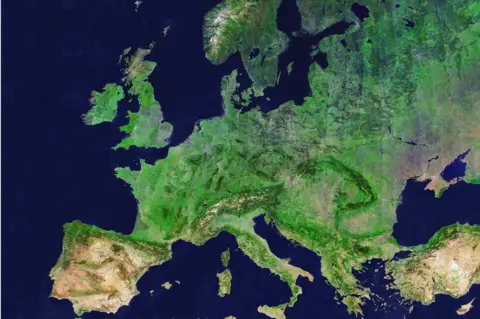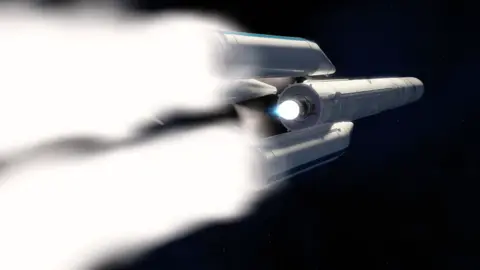European Commission seeks to boost space spending
 COPERNICUS DATA/SENTINEL HUB/P.MARKUSE
COPERNICUS DATA/SENTINEL HUB/P.MARKUSEThe European Commission has set out how it wants to spend the next EU space budget.
Officials have proposed spending some €16bn (£14bn) over the years 2021-2027.
The biggest segment, €9.7bn, would go on the further development and maintenance of Europe's sat-nav programmes, Galileo and Egnos.
€5.8bn would fund the Copernicus Earth observation project; and €500m would support secure satellite communications and space environment monitoring.
These two latter activities are new for the EU and go by the names of GovSatCom and Space Situational Awareness (SSA).
Commissioner Elżbieta Bieńkowska detailed the proposal in a press conference in Brussels.
"Europe is a space power and intends to remain a space power," she said.
What does the EU want to do in space?
- Galileo is Europe's version of the American's Global Positioning System (GPS). Egnos is an 'overlay' that ensures existing sat-nav signals are precise enough to be used to land planes.
- Copernicus is an Earth observation project. Seven satellites are already in orbit; 25 are in development. Known as Sentinels, the spacecraft gather data to inform and enforce EU policies.
- GovSatCom is a new initiative. It would pool member states' secure satellite telecommunications for use by, for example, police forces, border agencies and diplomats.
- Space Situational Awareness is about ensuring the orbital environment stays safe through collision avoidance and debris mitigation. Better tracking of space objects is a high priority.
- The EC will ensure all EU-programme satellites are launched on European rockets to support the bloc's independent launcher industry. It would like all EU states to make the same commitment.
- Emphasis is also being placed on supporting 'New Space' companies that have disruptive ideas. This will see more risk financing being made available through the EU for space SMEs.
Everything, even in space, has a Brexit angle
The €16bn total budget is an increase of about €5bn (at current prices) on the present seven-year Multi-annual Financial Framework, or EU budget.
All the numbers come with caveats, however. First, they are an aspiration. They need to go through the normal democratic channels in the European Parliament and in member states to get approval, and this can be a protracted affair.
There is no guarantee at the end of the process that the numbers will be the same.
Another factor to recognise is that the monies represent only part of the funding for programmes.
A quarter of the cost of Copernicus, for example, is borne by the European Space Agency, an intergovernmental organisation that is separate legally from the EU, but which Brussels uses for technical advice and procurement.
The other key consideration is that all the numbers announced by Commissioner Bieńkowska assume no contribution from the UK.
Britain wishes to stay in EU space programmes even after it has left the Union next March, and is prepared to pay an appropriate membership sum. If it bought in at its exiting percentage share, this could boost the overall budget by more than a billion euros.
Such an association has still to be negotiated, though, and in the case of Galileo is proving particularly fraught as the UK's imminent "third country status" puts it outside the security arrangements for the sat-nav system.
Brussels appears to be insisting that the rules are inviolate. This has prompted London to consider building a rival to Galileo, and even to threaten a block on the transfer of technologies British companies have developed for the European system.
Not quite a space agency
It is partly because of these diplomatic skirmishes that a new proposal for the regulation of EU space programmes is now under intense scrutiny.
Brussels wants to tighten and, in its words, streamline the management of activities like Galileo and Copernicus.
This would involve bringing all Union space activity under one body, which the Commission is calling the "EU Agency for the Space Programme". It would be a beefed-up version of the Prague-based office that currently supervises only Galileo.
Brussels says the new EU agency's role will be to "support market uptake and play an increased role in security accreditation".
The European Space Agency, it says, will remain "the main partner in programme implementation, given its unmatched expertise".
Nonetheless, there will be those who will see this initiative as an attempt to encroach on Esa territory - to strengthen the commission's influence within the intergovernmental organisation.
Any attempt, though, to dilute the independence of Esa would likely be rebuffed by its member states. And Commissioner Bieńkowska sought to dismiss such an analysis: "There is definitely no transfer of competence from the European Space Agency to the future Agency for the Space Programme," she told reporters.
"All the institutions need [each other]. We are just strengthening the EU agency for the programmes to adapt itself to the new space activities and the security accreditation."
 ArianeGroup
ArianeGroupIf the UK is allowed back into the various programmes it will obviously increase the scope of what can be achieved.
The money proposed for Copernicus on Wednesday, for example, is less than many had hoped.
Esa is currently in the process of defining six additional Sentinel satellites for the programme. How many of these spacecraft can actually be implemented depends on the budget available.
Dr Josef Aschbacher, the head of Earth observation at Esa, told the BBC this week that he would not prioritise one type of satellite over another - all are equal in importance in his mind, whatever the financial constraints.
It is one of the ironies of Brexit that as negotiations continue between London and Brussels, British engineers and scientists remain at the forefront in designing the EU's future space infrastructure.
Britain, through the Airbus company, is leading the definition on two missions - one to measure land surface temperature, and the other to measure the extent of ice fields at the poles.
[email protected] and follow me on Twitter: @BBCAmos
